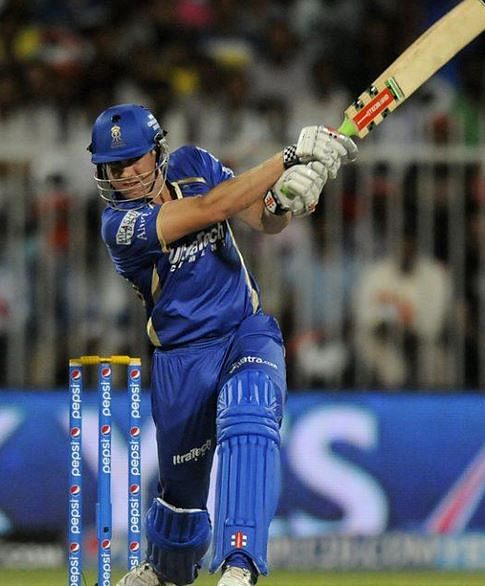
Interview: James Faulkner opens up on his childhood heroes, beef with West Indian players, and that over against Mumbai Indians

James Faulkner is one of the the best examples you could find of a modern-day cricketer. He is good at all aspects of the game; let it be batting, bowling or fielding. Still just 24, he has already become an established member of the Australian side in the shorter formats of the game. Having played 24 ODIs, Faulkner is known more his death bowling skills and big hitting at the end overs. He has currently picked up 36 wickets and has a batting average of 46 in ODI cricket.
Since making his international debut in a T20 game against India back in 2012, Faulkner has turned heads with his aggressive style of cricket. Away from international cricket, the left-arm fast bowler has starred in the IPL playing for the Rajasthan Royals, who retained his services for the 2014 season following his sublime performances for the franchise in 2013.
Sportskeeda had the opportunity to catch up with the Tasmanian and spoke to him on a number of issues. Here are the excerpts from the interview:
You come from a cricketing background, but when did you first genuinely think that you could become an international cricketer?
As a young kid growing up, it was just a dream to play for Australia. Playing cricket in the backyard with my family, it was an inspiration. A lot of Australian children growing up want to play cricket for the country. Well, in that aspect, I suppose I am very lucky that it worked out well for me.
Who were your cricketing idols while growing up?
I didn’t have specific idols in cricket while growing up; it was more of a mixture of different players from different decades. I suppose it’s hard to go past Ricky Ponting as a Tasmanian. Then, there was Dennis Lille who used to bowl very fast. Allan Border was another; he was a tough cookie and a very good captain. Like I said, it was a mixture of a lot of good players.
You mentioned Ricky Ponting, how special was it to put in a Man of the Match performance for Tasmania in the final of the 2012/13 Sheffield Shield final which happened to Ponting’s only triumph in the competition?
Yeah, it was special. It was Ricky’s first Sheffield Shield and something he couldn’t achieve with Tasmania in his cricketing career. That is something that lifted the team over the five days of the final, to win it for Tasmania and for Ricky himself.
Coming to international cricket, do you see yourself more as a batting all-rounder or a bowling all-rounder these days?
I try to get into the team in whichever possible way I can. In different formats, you tend to lean on one speciality or the other. In an ideal world, as an all-rounder I’d like to see myself being equally good with the bat and the ball.
You have played some fabulous knocks coming lower down the order for Australia over the last year. Between Mohali, Bangalore, and the Gabba, which one was your favourite?
It’s tough to single any of them out, but when your team wins it’s far more special. I suppose the century at Bangalore was nice, but the other two were better as we won the games. Winning is why you play the game. You don’t play for individual success, you play cricket to win with a great bunch of blokes. In that aspect, Mohali and Gabba were two special days.
You made your Test debut at The Oval last year, but haven’t been selected in the format since. With the current Australian Test fast bowlers doing very well, when can we expect you back into the Test side?
When I made my debut, it was the last Ashes Test over in England and a lot of things changed by the time they came to Australia. As everyone knows, Australia played the same XI throughout the Ashes series over the Australian summer. So it was very hard to get a spot as the boys played exceptionally good cricket and a brand of cricket that we want to continue playing as a group.
Your comment stating that you don’t “particularly like” the West Indian players created quite a stir at the World T20 earlier this year. Was it something that came out spontaneous?
I didn’t actually say that I didn’t like them. The quote was put out of context. What I meant was that when you walk over the line before the start of a match, you try to beat any opposition you come up against. It wasn’t a personal attack on the country or any of the players. Like I said, it was taken out of context. It was a long time ago and it’s gone now.
What did you think of the celebrations from the West Indian players after the game?
Look, they won the game and were entitled to celebrate in whatever way they wanted to. They won the game of cricket and it was their choice how they wanted to celebrate.

Coming to the IPL, you spent a season each at Pune Warriors India and Kings XI Punjab without much success. What went right at the Rajasthan Royals?
Obviously, it didn’t go too well at the first two teams and I ended up at Rajasthan which is a very good franchise. I am very happy to be at Rajasthan and hope to be there for a really long time.
In the recently concluded IPL season, what was going through your mind when you bowled the 15th over against the Mumbai Indians?
I suppose, compared to normal, it was a different situation. When you’re chasing 190 odd in 14-15 overs, it has to be a hell of a chase to get close and all the momentum was going their way at that stage. In the end, they were just too good.
There was talk of bowling a wide, but then the ball wouldn’t have counted and hence, there was no point bowling a wide. It was a very difficult task for the Mumbai Indians and if you are going to chase that, you deserve to win and go through. They deserve credit.
If 14.4 was a dot ball, would you have bowled a wide or a no ball off the next delivery to see your team through?
Ah, I would have but I’m not too sure what the plan would have been. I would have had to listen to what the captain said. I’m not sure if they would have gone through if they had been able to hit a boundary on the next ball (14.5).
At the end of the game, we saw Rahul Dravid throw his cap in disgust. It was probably the angriest emotion he has displayed on a cricket field. What did he say to the players in the dressing room after the game?
Nothing really, everyone was obviously very disappointed. We had posted a very good total and they chased it down in the required overs. Fingers weren’t pointed at anyone as they chased down such a huge total in 14.4 overs and they hit everyone out of the park. They were just too good on the day.
Any word on the young Indian talent at the Rajasthan Royals? You worked with the likes of Sanju Samson and Karun Nair from close quarters.
Yeah, I think the young players have a helluva lot of talent. They have a very bright future as long as they work hard on their game.
You have played international cricket under the captaincy of Michael Clarke and George Bailey, and in the IPL under Rahul Dravid and Shane Watson. How do their captaincy styles differ from each other?
Well, they are completely different captains. I’m not going to single anyone out as they are all greats of the game and are very, very good players. They all bring different things to the table, with different groups. I think captaining an IPL team is very different to captaining an international side, as in the latter all the players are from the same place.
IPL is a lot different; it has players coming from across the world with different cultures and backgrounds. So you have to mould all that together into a group and Rahul did that very well. Shane did a very good job as well.